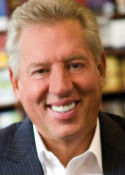Ray Kroc, the former milkshake machine distributor who founded McDonald’s when he was in his early 50s, once made an insightful statement about the relationship between luck and achievement.
He said, “Luck is a dividend of sweat,” he said. “The more you sweat, the luckier you get.”
Compare Kroc’s rather tongue-in-cheek comment to the lottery mindset that some people actually have about success. “Some day my number will come up,” they think. “I’ll be at the right place at the right time and voila! I’ll find my four-leaf clover and achieve all my dreams. All I need to be successful is a little bit of luck.”
With that kind of attitude, success is the last thing those folks will ever experience.
Unfortunately, the idea that successful individuals are “just lucky” is not the only erroneous notion many people have about success or what it takes to be successful. Here are several other incorrect thoughts that can hamper a person’s ability to succeed.
- Success is mystical.
People who have this view aren’t exactly sure what it is that makes someone successful. But they believe that, once they discover that elusive “secret to success” themselves, they’ll be well on their way to reaching their desired level of achievement. - Success is viewed with suspicion.
Individuals who fall prey to this myth are constantly looking at successful people and asking questions such as, “Who did they take advantage of? Who did they make money off? Who did they run over to get where they are?”They simply can’t believe that anyone could become truly successful without taking shortcuts or using other people.
- Success equals hard work.
This is the theory that says, “The early bird gets the worm, and if you want to be successful, all you have to do is work your tail off from sunup to sundown.” This idea looks good on paper, but it doesn’t always pan out in real life.I firmly believe in the virtue of hard work, but I also know lots of very hard workers who haven’t been very successful.
- Success is an event.
If you have this mindset, you are constantly looking for that milestone event—a powerful conference, a key decision, an important meeting, the attainment of a specific title—that is going to be the turning point in your quest for success.Unfortunately, success doesn’t hinge on any one event or place; it’s a growth process—a journey.
- Success triggers envy.
This can take many different forms. There’s blatant envy: “Why does she get all the accolades and all the responsibility and not me? It’s not fair.” Other times, the jealousy comes across as passive resignation: “Success comes naturally to him, but it’s never going to come to me. It’s simply beyond my reach.” - Success is in the future.
It’s one thing to be optimistic about the future. But it’s another thing entirely to think that, if you’re patient, you’re just going to happen upon success someday. You’re more likely to find a pot of gold on your driveway tomorrow morning than you are to find success “somewhere over the rainbow.” - Opportunity equals success.
People who hold this common misconception think, “If I could just get one big break, then I’d be on my road to success.” They’re waiting for the right opportunity to fall into their laps—the big break that will change their lives forever. - Success hinges on a relationship.
In other words, it’s not your fault that you’re not successful. You were simply born into the wrong family. Or you didn’t make the right friends in college. Or you haven’t made the right connections in your industry yet. But as soon as you meet the right person, you’ll be on your way.
Do any of these ideas sound familiar? Perhaps you know people who hold these views. Or maybe, if you’re honest, you have thought them yourself. If so, I’m here to tell you that success is within your reach right now.
It’s not some pie-in-the-sky concept that only comes true for a select, privileged few. It’s attainable for you—today.
The secret to success can’t be found in some mystical self-help book. It is determined by your willingness to improve yourself and your commitment to starting that process now—not tomorrow, not next week, but today.
Don’t put off until tomorrow what you can achieve today. If you want to succeed, start growing.
free monthly e-newsletter: Leadership Wired
available at www.INJOY.com.
John Maxwell grew up in the 1950s in the small Midwestern city of Circleville, Ohio. John's earliest childhood memory is of knowing that he would someday be a pastor. He professed faith in Christ at the age of three, and reaffirmed that commitment when he was 13. At age 17, John began preparing for the ministry. He attended Circleville Bible College, earning his bachelor's degree in 1969. In June of that same year, he married his sweetheart, Margaret, and moved to tiny Hillham, Indiana, where he began his first pastorate.
While serving in his second church, Maxwell began to study the correlation between leadership effectiveness and ministry effectiveness. On July 4, 1976, while preaching at a service commemorating America's bicentennial, John sensed that God was calling him into a ministry to pastors. Within days after that event, pastors began to contact him, asking for his assistance in nurturing their churches. Over the next four years, on an informal basis, John helped scores of fellow pastors. Then, in 1980, he was asked to become Executive Director of Evangelism for the Wesleyan denomination.
Though his time at Wesleyan headquarters was productive, John soon realized that his deeper desire was to help pastors from numerous denominations. He knew that desire would be unfulfilled if he were to stay at denominational headquarters. As a result, in 1981 John accepted the call to return to the pastorate, this time at Skyline Wesleyan Church in the San Diego, California area. But he did so with the church's blessing to pursue his vision. The Skyline congregation allowed him to continue mentoring and assisting pastors even as he led them to new levels.
In 1985, as he continued to equip and encourage other pastors, John took the next crucial step in leadership development. He founded a new company called INJOY and created the INJOY Life Club, featuring a monthly tape for leaders. The fledging operation, established in the corner of a garage, was soon bursting at the seams. The INJOY Life Club tapes were received with great enthusiasm, and the number of subscriptions quickly increased from hundreds to thousands. Simultaneously, the demand for other resources and seminars exploded. Pastors from coast to coast were responding, and their desire for help was even greater than John had anticipated.
As the years passed, INJOY began demanding more and more of John's time. In 1995, he resigned from his position as senior pastor at Skyline following a very fruitful 14-year tenure. The church had tripled in size and its lay ministry involvement had increased ten-fold. Dr. Maxwell is in great demand today as a speaker. Through his bestselling books, audio and video resources, and major conferences, he communicates directly with more than one million people every year. He is frequently asked to speak for organizations such as Promise Keepers and Focus on the Family, but his greatest joy and desire is to help pastors become better leaders.
Because the need for leadership development knows no borders, John established EQUIP, a non-profit organization which trains leaders in urban communities, academic institutions, and within international organizations. EQUIP is also spearheading a movement which has enlisted more than one million pastoral prayer partners who covenant to pray specifically for those who shepherd God's flock.
John continues to seek new opportunities to help churches and church leaders. He knows that one thing is constant: the only hope for the world is salvation through the Lord Jesus Christ, who gives life abundantly.






